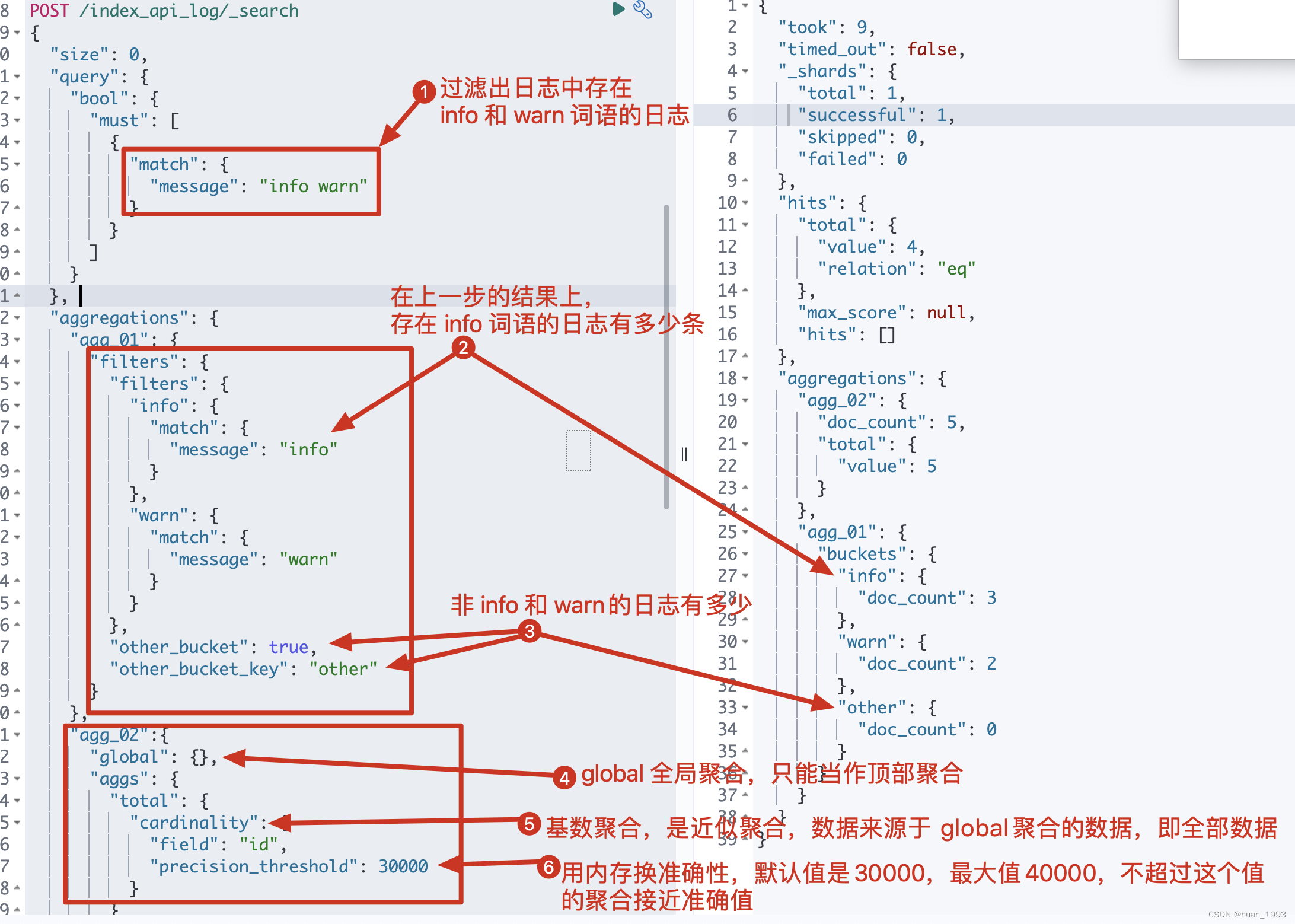目录
1. 背景
此处将单记录一下 global 、 filters和cardinality的聚合操作。
2、解释
1、global
global聚合是全局聚合,是对所有的文档进行聚合,而不受查询条件的限制。
global 聚合器只能作为顶级聚合器,因为将一个 global 聚合器嵌入另一个桶聚合器是没有意义的。
比如: 我们有50个文档,通过查询条件筛选之后存在10个文档,此时我想统计总共有多少个文档。是50个,因为global统计不受查询条件的限制。
2、filters
定义一个多桶聚合,其中每个桶都与一个过滤器相关联。每个桶都会收集与其关联的过滤器匹配的所有文档。
比如: 我们总共有50个文档,通过查询条件筛选之后存在10个文档,此时我想统计 这10个文档中,出现info词语的文档有多少个,出现warn词语的文档有多少个。
3、cardinality
类似于 SQL中的 COUNT(DISTINCT(字段)),不过这个是近似统计,是基于 HyperLogLog++ 来实现的。
3、需求
我们有一组日志,每条日志都存在id和message2个字段。此时根据message字段过滤出存在info warn的日志,然后进行统计:
- 系统中总共有多少条日志(
global + cardinality) - info和warn级别的日志各有多少条(
filters)
4、前置条件
4.1 创建mapping
PUT /index_api_log
{
"settings": {
"number_of_shards": 1
},
"mappings": {
"properties": {
"message":{
"type": "text"
},
"id": {
"type": "long"
}
}
}
}
4.2 准备数据
PUT /index_api_log/_bulk
{"index":{"_id":1}}
{"message": "this is info message-01","id":1}
{"index":{"_id":2}}
{"message": "this is info message-02","id":2}
{"index":{"_id":3}}
{"message": "this is warn message-01","id":3}
{"index":{"_id":4}}
{"message": "this is error message","id":4}
{"index":{"_id":5}}
{"message": "this is info and warn message","id":5}
5、实现3的需求
5.1 dsl
POST /index_api_log/_search
{
"size": 0,
"query": {
"bool": {
"must": [
{
"match": {
"message": "info warn"
}
}
]
}
},
"aggregations": {
"agg_01": {
"filters": {
"filters": {
"info": {
"match": {
"message": "info"
}
},
"warn": {
"match": {
"message": "warn"
}
}
},
"other_bucket": true,
"other_bucket_key": "other"
}
},
"agg_02":{
"global": {},
"aggs": {
"total": {
"cardinality": {
"field": "id",
"precision_threshold": 30000
}
}
}
}
}
}
5.2 java 代码
@Test
@DisplayName("global and filters and cardinality 聚合")
public void test01() throws IOException {
SearchRequest request = SearchRequest.of(searchRequest ->
searchRequest.index("index_api_log")
// 查询 message 中存在 info 和 warn 的日志
.query(query -> query.bool(bool -> bool.must(must -> must.match(match -> match.field("message").query("info warn")))))
// 查询的结果不返回
.size(0)
// 第一个聚合
.aggregations("agg_01", agg ->
agg.filters(filters ->
filters.filters(f ->
f.array(
Arrays.asList(
// 在上一步query的结果中,将 message中包含info的进行聚合
Query.of(q -> q.match(m -> m.field("message").query("info"))),
// 在上一步query的结果中,将 message中包含warn的进行聚合
Query.of(q -> q.match(m -> m.field("message").query("warn")))
)
)
)
// 如果上一步的查询中,存在非 info 和 warn的则是否聚合到 other 桶中
.otherBucket(true)
// 给 other 桶取一个名字
.otherBucketKey("other")
)
)
// 第二个聚合
.aggregations("agg_02", agg ->
agg
// 此处的 global 聚合只能放在顶部
.global(global -> global)
// 子聚合,数据来源于所有的文档,不受上一步query结果的限制
.aggregations("total", subAgg ->
// 类似于SQL中的 count(distinct(字段)),是一个近似统计
subAgg.cardinality(cardinality ->
// 统计的字段
cardinality.field("id")
// 精度,默认值是30000,最大值也是40000,不超过这个值的聚合近似准确值
.precisionThreshold(30000)
)
)
)
);
System.out.println("request: " + request);
SearchResponse<String> response = client.search(request, String.class);
System.out.println("response: " + response);
}
5.3 运行结果
